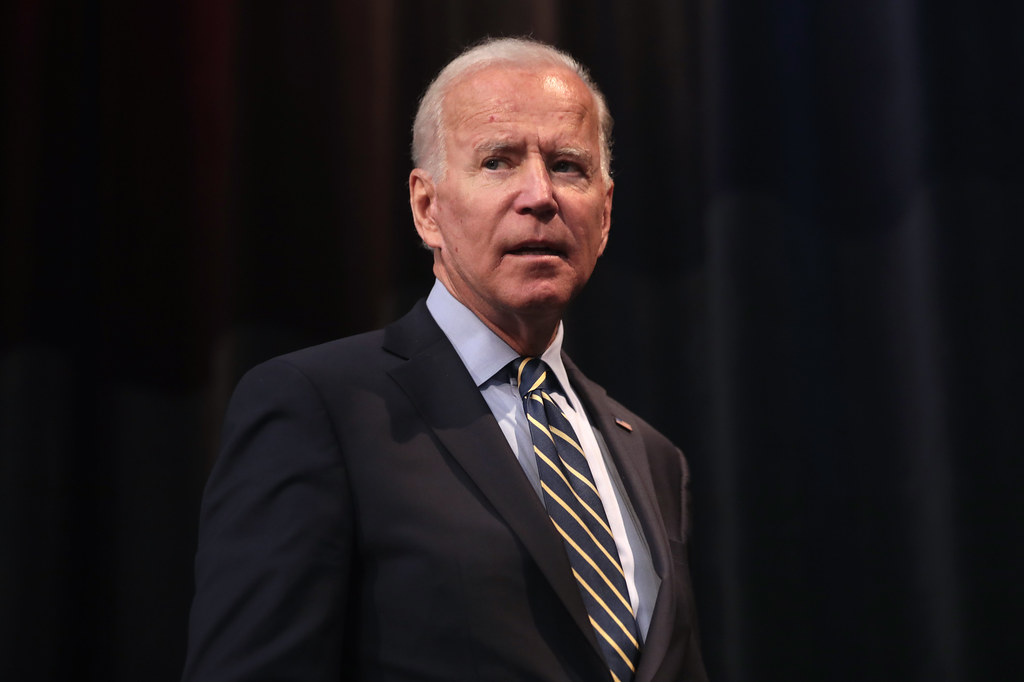Originally published on January 29, 2024
-
Joe Biden has halted LNG expansion, which the world needs for low-cost, reliable, secure energy.
He pretends it's to lower prices or GHG emissions, but it will do neither.
Halting LNG is pure electioneering. And we’ll all pay the price.
-
We live in a world that needs much more energy. Energy poverty is rampant, and even the wealthy world has chronic energy shortages.
Natural gas can dramatically help because it is low-cost, reliable, versatile, clean, and secure. And America can lead.
-
America has a virtually limitless supply of natural gas and an incredible ability to ramp up production quickly. E.g., between 2017 and 2018 we were able to increase gas production by 10B cubic feet per day—the equivalent of 1.7M barrels of oil (72M gallons) per day.1
-
The key to unleashing natural gas’s huge potential is transportation.
Pipelines enable domestic transport so gas can get from where it is drilled to where it is needed. And by cooling gas to very low temperatures, we can turn it into LNG for cost-effective transport abroad.
-
When Democrats took power of Congress in 2019, they could have lowered natural gas prices by increasing accessible supply: building many more pipelines and LNG export terminals.
Tragically, they did the exact opposite—stopping the transport of every cubic foot of gas they could.2
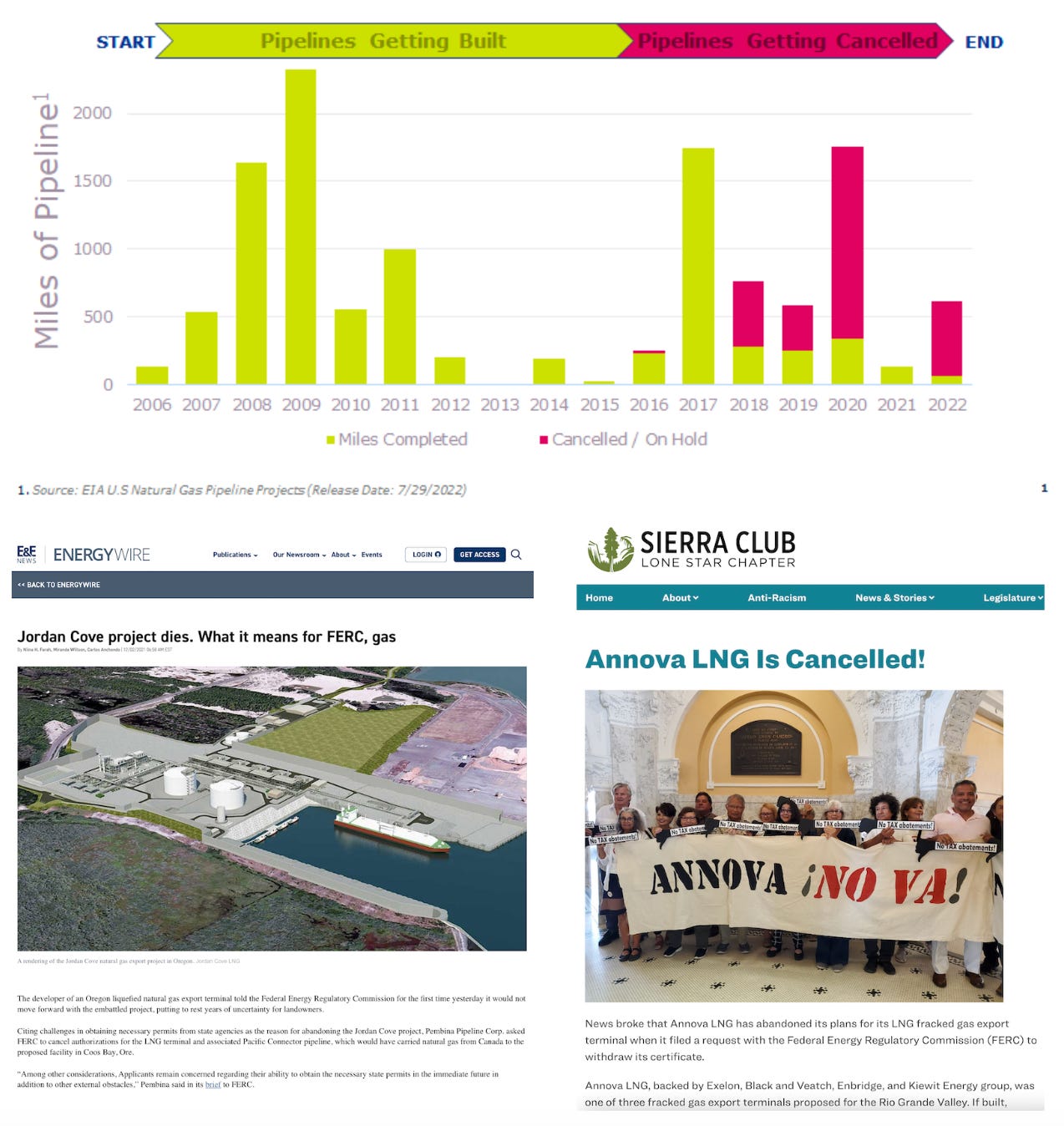
-
Biden is now harming natural gas even more by halting LNG exports—despite their incredible potential to bring millions out of energy poverty. Why?
Biden: “We will heed the calls of young people and frontline communities.”
Translation: We want votes from ignorant, gullible activists.3
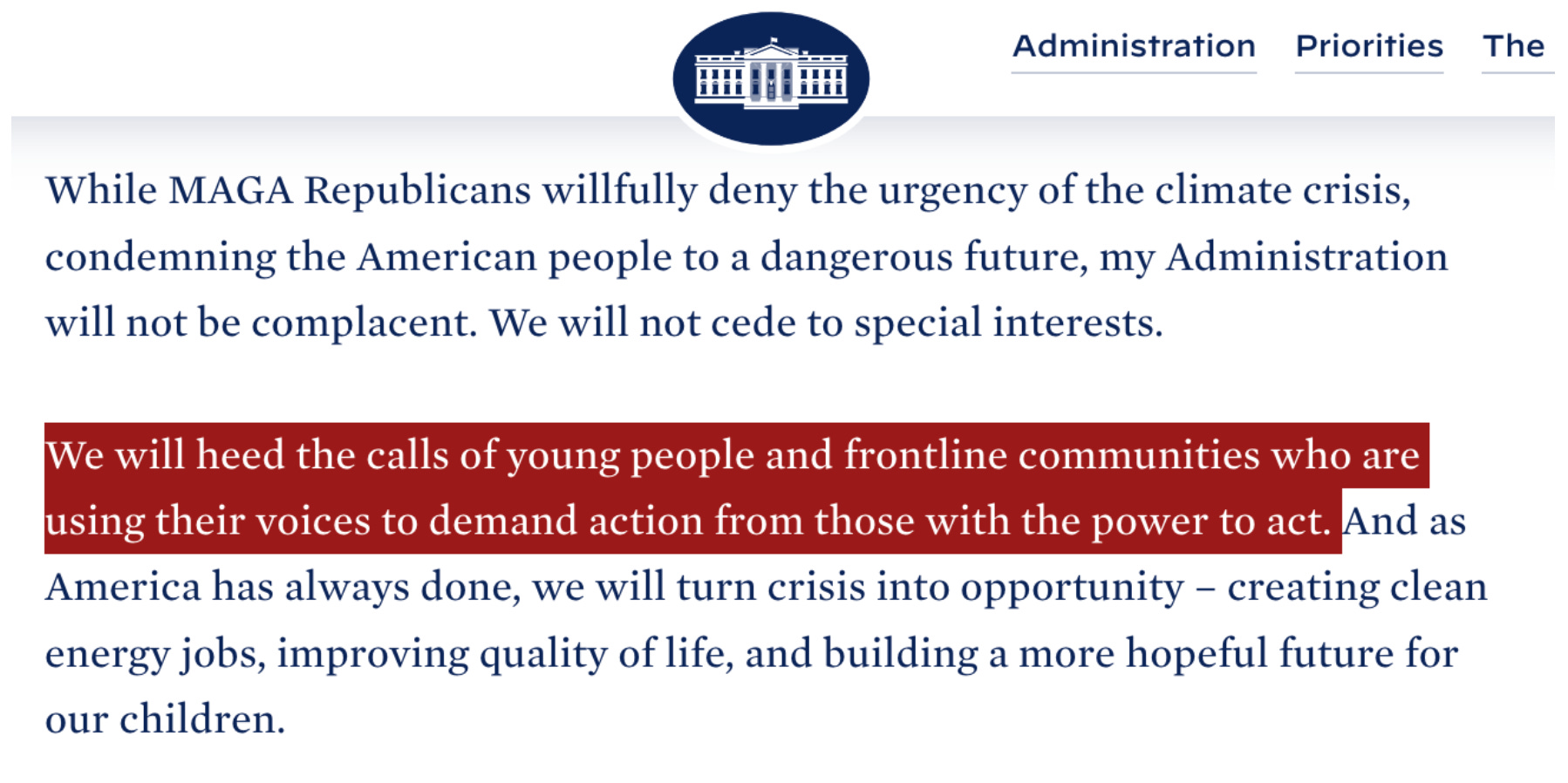
-
Biden’s electioneering is undeniable in the face of the fact that not only will halting LNG exports deprive America and allies from enormous LNG export benefits—but it will lead to neither of the policy’s purported aims, namely to decrease natural gas prices and GHG emissions.
-
Myth: Biden’s policy will protect us from “the climate emergency” by halting emissions-increasing LNG exports.
Truth: There is no “climate emergency.” Fossil fuels, including LNG, have made us far safer from climate than ever—and LNG actually tends to reduce GHG emissions.
-
The US is not in a “climate emergency”. Rising CO2 levels are:
- Not dire: Humans are safer from climate than ever.
- Not temporary: They will rise for decades.
- Not in our control: We emit 1/7 of CO2—and falling.4
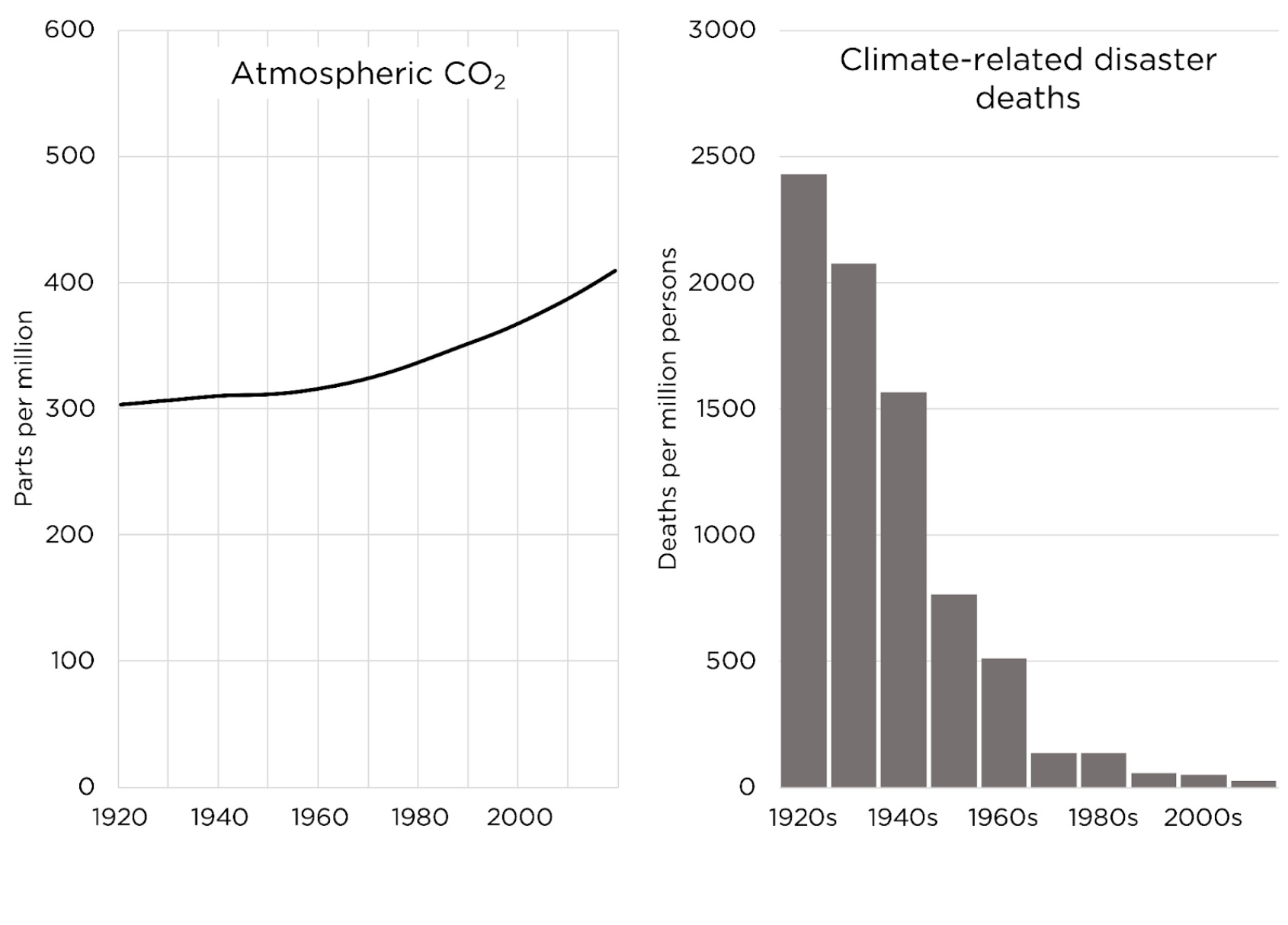
-
GHG emissions reduction is not necessitated by any sort of “climate emergency,” but even if it were, halting LNG exports wouldn’t help.
LNG’s main substitute is coal, which in virtually every analysis emits more than LNG.
-
Several studies, including this 2019 study from the openly “sustainability”-focused Department of Energy-run National Energy Technology Laboratory, have found that US LNG produces significantly less GHG emissions than both Russian natural gas and coal over a 100-year timespan.5
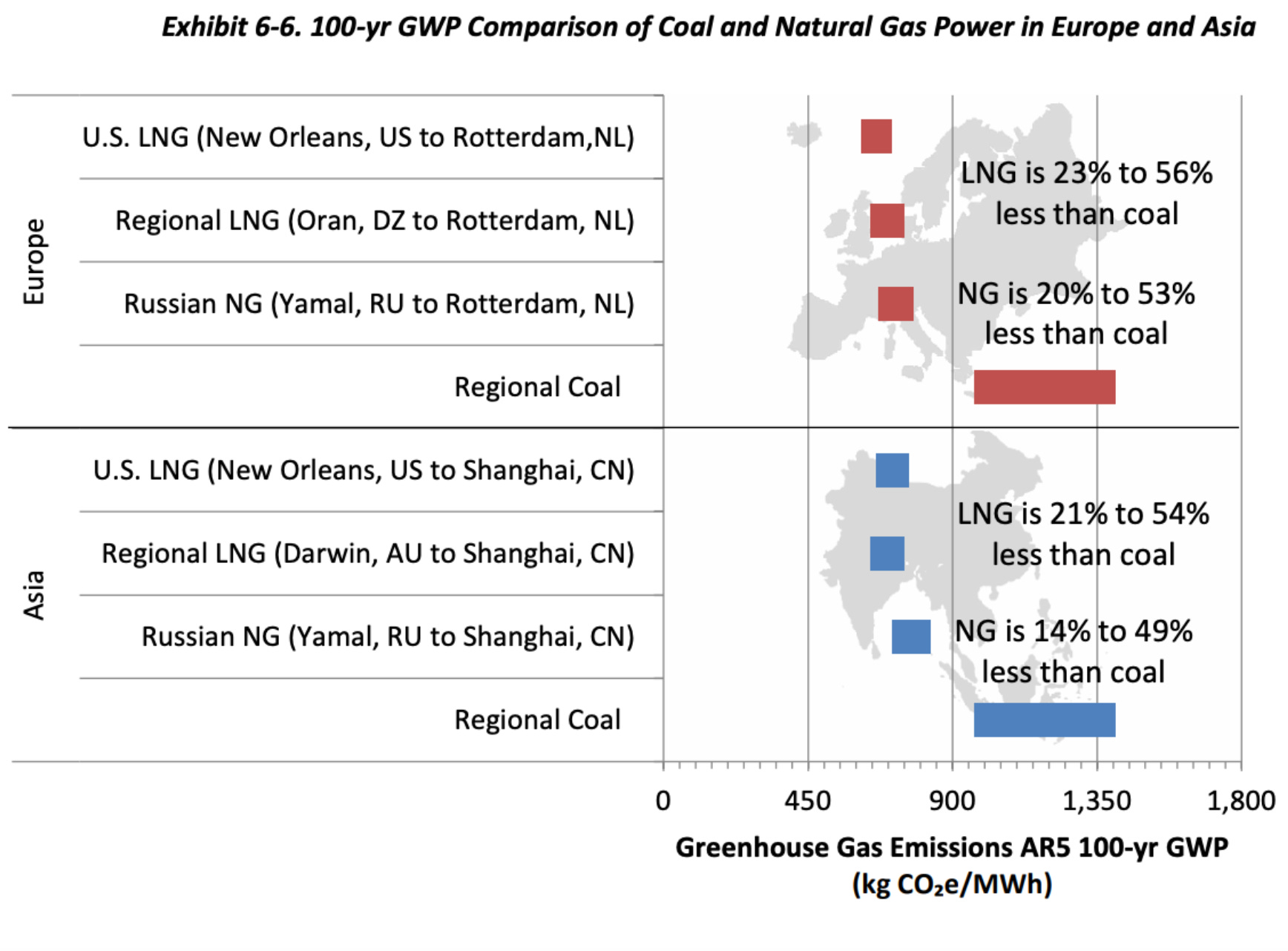
-
The one study cited by Biden’s “green” supporters is a non-peer-reviewed, unpublished study expressing the highly implausible view that liquefying and transporting natural gas, a fuel that has ½ the emissions of coal when burned, will make it emit more than coal.6
-
Biden's LNG statement makes a jab at “MAGA Republicans” for “willfully deny[ing] the urgency of the climate crisis”—i.e., not adopting his anti-fossil-fuel narrative.
This isn't the language of someone trying to help America; it’s the language of someone trying to get reelected.7
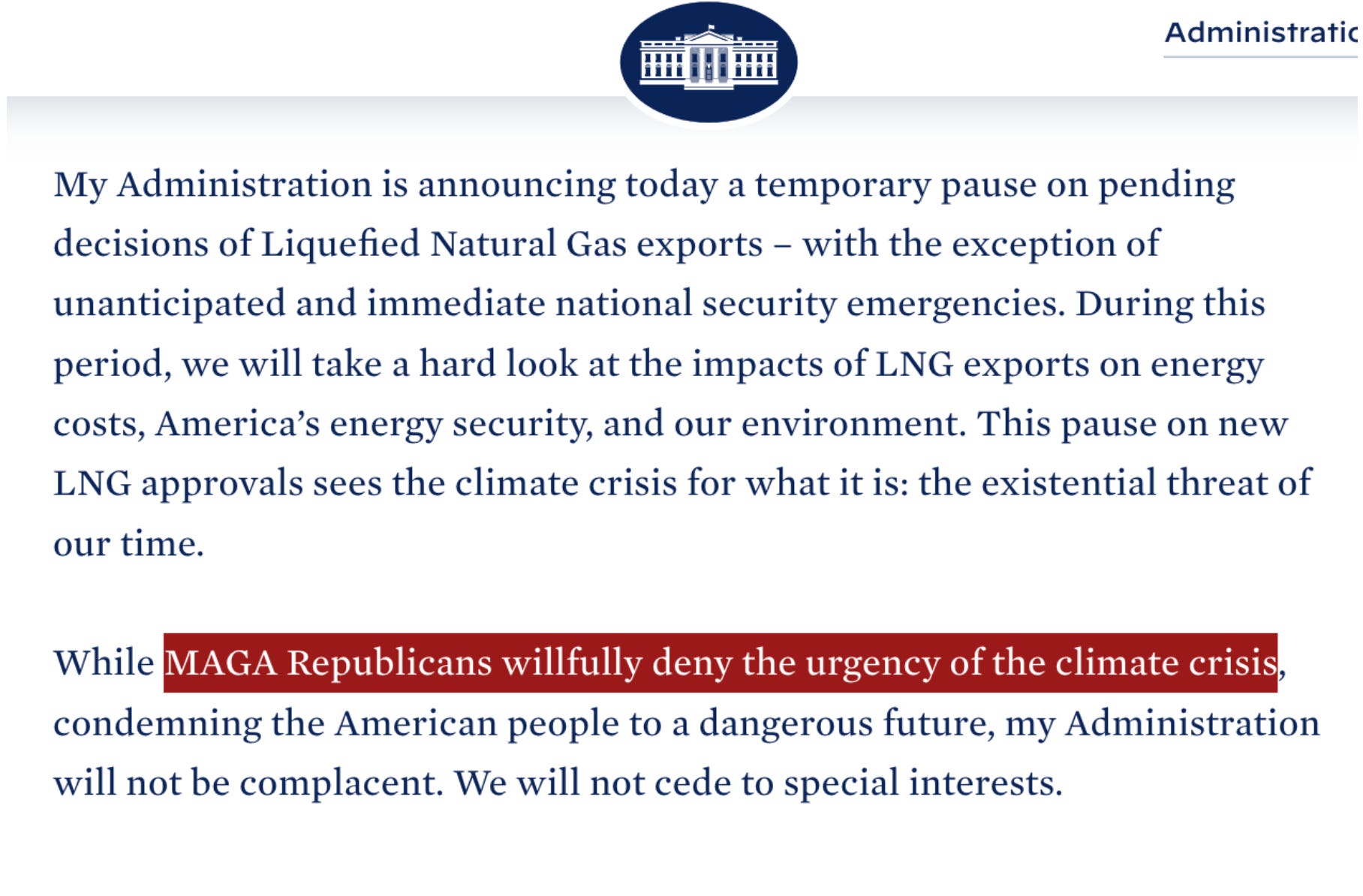
-
Myth: Biden is halting LNG exports out of concern for lower natural gas prices.
Truth: Biden’s entire anti-fossil-fuel agenda is designed to increase natural gas prices, and halting LNG will as well by reducing investments in natural gas production long-term.
-
The more we are free to produce, transport, and export our massive supply of natural gas, the more America reaps the benefits of cheap, stable natural gas prices at home and lucrative trades with allies abroad.
Biden’s LNG pause will make natural gas expensive and scarce.
-
Destroying a US industry's ability to export doesn’t make its product cheaper long-term.
Halting the growth of LNG export may temporarily suppress prices by stranding production, but its long term effect will be to raise prices by destroying investment in the industry.
-
If Biden actually wanted cheaper natural gas, he would roll back his entire anti-fossil-fuel agenda of punishing fossil fuel investment, production, transport, and use.
But he hasn’t, because his goal is high natural gas prices, the only way to induce the radical reductions in use Biden wants.
-
The LNG pause is particularly ominous in the realm of energy security where, as we saw after Russia’s 2022 invasion of Ukraine, Europe’s dangerous hostility towards domestic gas led it to crisis when they could no longer rely on Russian imports and needed US LNG to save them.8
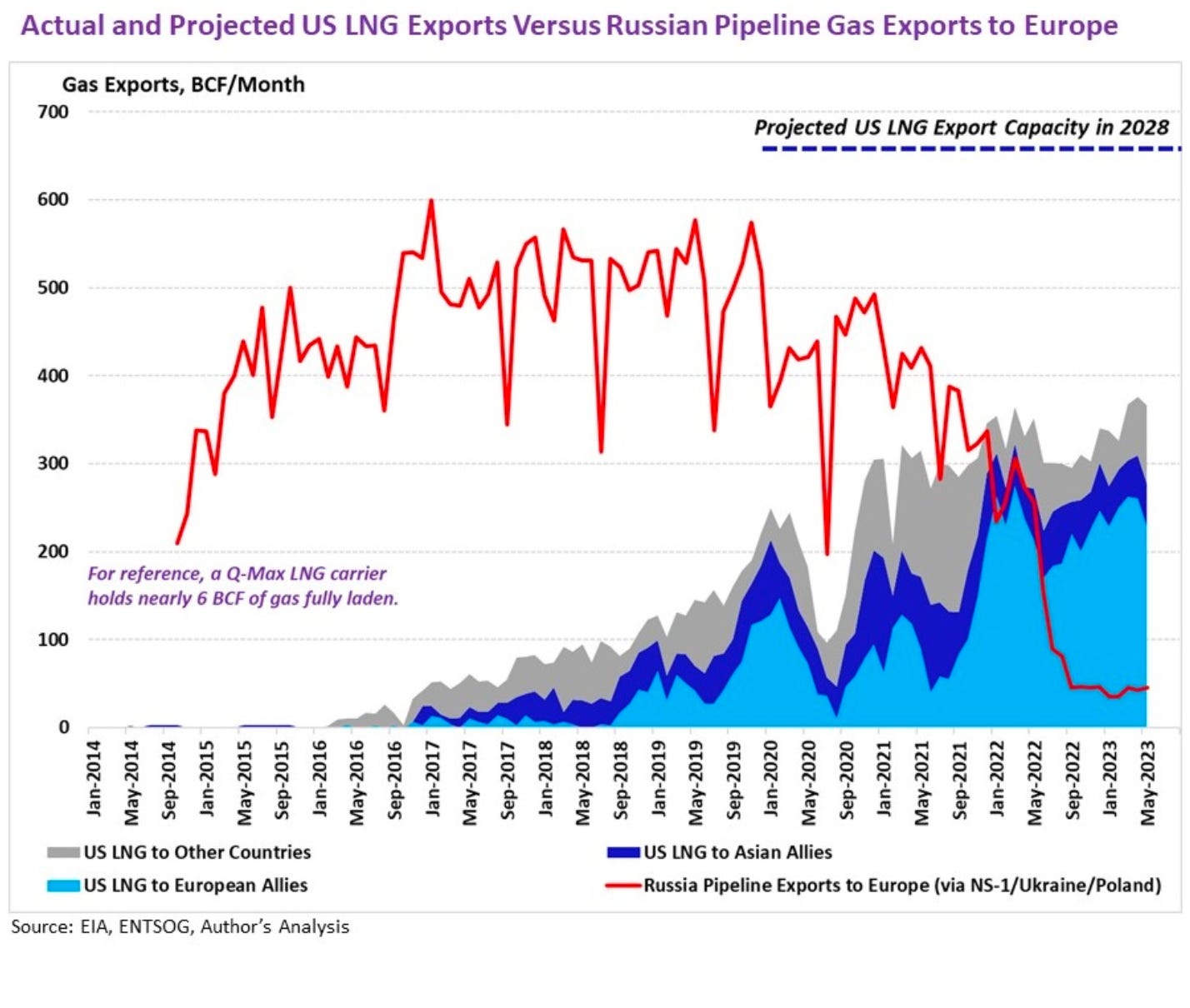
-
Right on the heels of Europe’s lack-of-natural-gas emergency, Biden is not just failing to continue the policies that saved Europe; he’s copying the policies that almost doomed Europe (which is now scared of winter like it’s Game of Thrones).9
-
Since Biden's deadly LNG pause is a ploy to get votes, Americans need to make clear to him that destroying our natural gas industry will cause him to lose our votes.
Please call the White House at 202-456-1111 and tell them to read this article and reverse course.
Michelle Hung and Steffen Henne contributed to this piece.
References
-
U.S. Energy Information Administration - U.S. Natural Gas Gross Withdrawals
U.S. Energy Information Administration - Natural gas explained, How much natural gas is left↩
-
EQT - Nationwide Poll Shows Nearly 70% of All Voters Support Increasing Natural Gas Production
E&E News - Jordan Cove project dies. What it means for FERC, gas
Sierra Club - Annova LNG Is Cancelled!
Alex Epstein - America’s energy crisis is mostly US Democrats’ fault↩
-
The White House - Statement from President Joe Biden on Decision to Pause Pending Approvals of Liquefied Natural Gas Exports↩
-
UC San Diego - The Keeling Curve
For every million people on earth, annual deaths from climate-related causes (extreme temperature, drought, flood, storms, wildfires) declined 98%--from an average of 247 per year during the 1920s to 2.5 per year during the 2010s.
Data on disaster deaths come from EM-DAT, CRED / UCLouvain, Brussels, Belgium – www.emdat.be (D. Guha-Sapir).
Population estimates for the 1920s from the Maddison Database 2010, the Groningen Growth and Development Centre, Faculty of Economics and Business at University of Groningen. For years not shown, population is assumed to have grown at a steady rate.
Population estimates for the 2010s come from World Bank Data.
-
National Energy Technology Laboratory - Life Cycle Greenhouse Gas Perspective on Exporting Liquefied Natural Gas from the United States: 2019 Update↩
-
U.S. Energy Information Administration - Carbon Dioxide Emissions Coefficients↩
-
The White House - Statement from President Joe Biden on Decision to Pause Pending Approvals of Liquefied Natural Gas Exports↩
-
Collins Research Portal - US LNG Is a National Security Asset↩
-
Alex Epstein - Europe’s energy security crisis
Alex Epstein - Holding the right people responsible for the global energy crisis↩
